Interviewing Angela Connor: How her career path and experience gave the vision to become a magazine publisher
Veteran journalist shares her career path and how those experiences as a Black woman led her to launch ASCENDING magazine, a publication that challenges the status quo and empowers women.
Welcome back to Don’t Forget My Voice, a newsletter to help you navigate journalism’s chaotic and toxic maze. I’m Mc Nelly Torres, a longtime investigative journalist, editor, trainer and mentor.
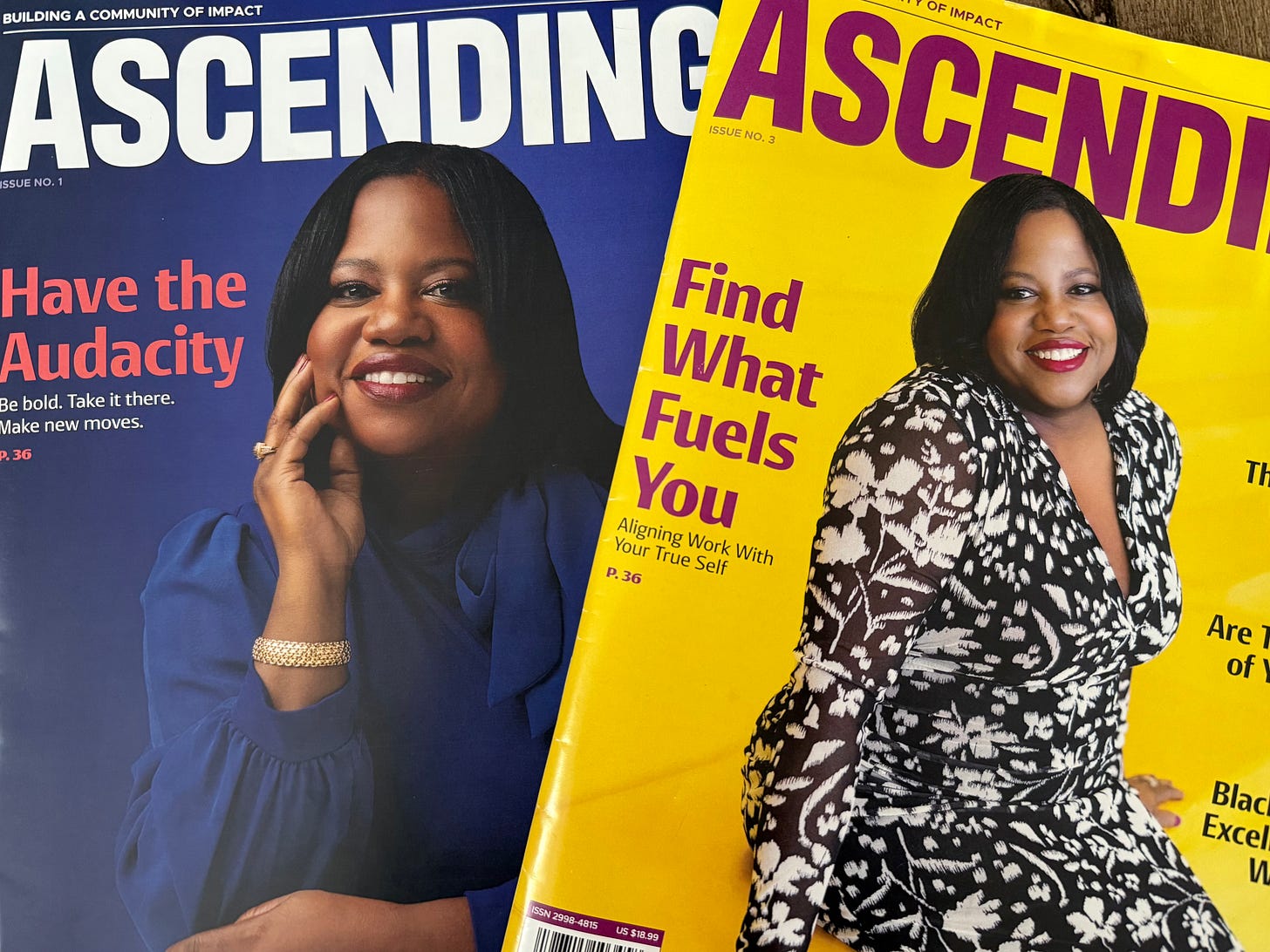
In her decades-long career, veteran journalist Angela Connor has never been afraid to take onto new career paths and platforms. She’s worked for broadcast and print. She published a book.
Angela also left the industry to work in public relations and marketing, moving up the ladder to join the executive ranks and eventually building her own firm.
I met Angela in mid-2000, when we were both working at the Sun-Sentinel. We stayed in touch through social media after she left Florida and moved to North Carolina. I always liked her enthusiasm, passion and willingness to collaborate with others.
You could say that Angela has done it all. But if you ask her, she will tell you that she's not done.
Last year Angela reached another goal — she became the publisher and editor-in-chief of ASCENDING magazine, a quarterly publication she designed to challenge the status quo, deliver in-depth perspectives and empower women.
The third issue was published recently, and Angela’s ambition is evolving with rigor and clarity. The magazine pieces are tackling tough topics, including the truth about office politics, Black women excellence, workplace trauma and aligning work with your true self. The topics are fraught, but the stories are uplifting.
Angela knows that there’s a need to create these spaces for all women in the workforce. Her magazine is trying to build that audience.
“Our lives are multifaceted and our challenges are many, and I want to explore it all, tell authentic stories that allow women to see themselves and also offer solutions to those challenges.”
I interviewed Angela live in Substack last March after I launched Don’t Forget My Voice. Although the video is available for you to watch, I thought that sharing the highlights of this conversation could be useful to those of you who like to read.
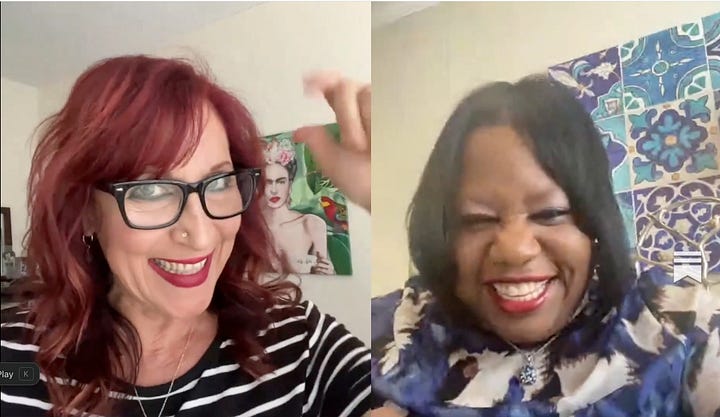
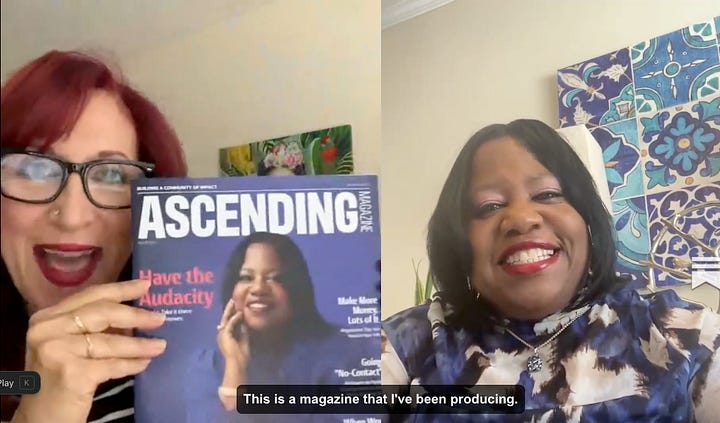
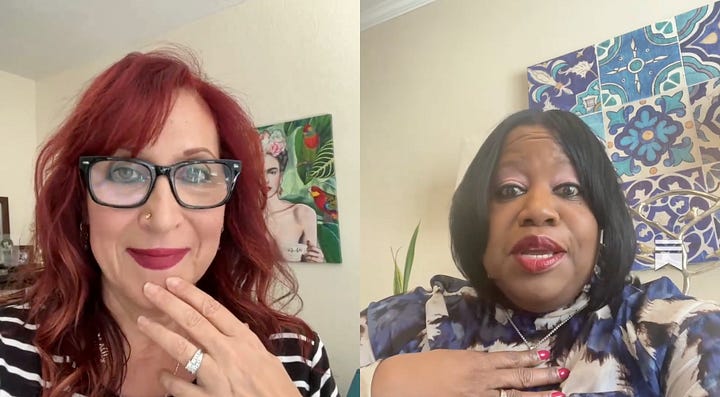
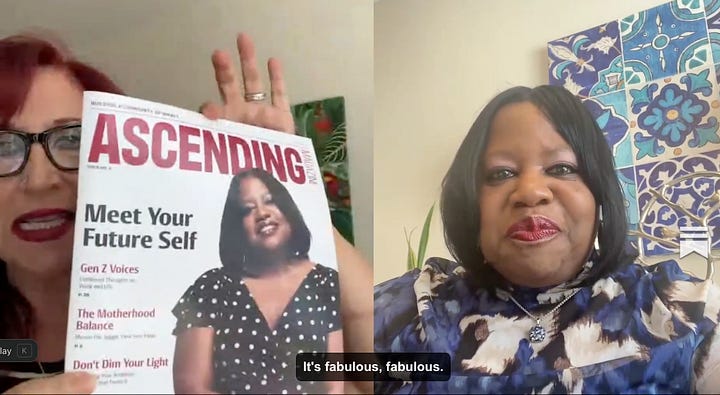
Here’s a selection of questions and answers from that discussion.
*This conversation has been edited for length and clarity.
Why ASCENDING? What’s the mission?
I’ve been a staunch advocate for women for a long time through mentorship and talking about the issues that are hard to talk about. I go to these conferences and we’d be talking about surface level things and the real conversations happened when the panels were over.
I wanted to have a place that was a safe space for women to talk about all the stuff that is not easy to talk about and women are scared to talk about at conferences. The mission of ASCENDING is to lift, guide and inspire professional women along the full spectrum of their careers.
Tell us what you have learned from this process (becoming a publisher).
I've learned that some of the barriers that we erect are manufactured, and then sometimes they're just rooted in a belief of something being too hard, or that we can't do it or it's just too much. I've learned that my bias for action is something that can really fuel me.
I know that I have a bias for action. I didn't always name it and frame it that way. I think that's a gift and a curse in corporate America, because sometimes it takes two years to talk about something before you can even do it. So, I struggle in that space. I learned that when you ask a question there's a 50-50 chance (that you’ll get what you want). So, why not? I've learned that you get none of the things if you don't ask for (them).
The magazine’s second issue has a wonderful piece titled “The Ambition Paradox.” Do you think that women of color become a threat to others when they are good at their jobs and have aspirations?
This is something that can happen to you early in your career, and you don't know that it's happening. You don't know that it's your ambition that has intimidated other people, or that not everyone wants to see you win. And that is not something that we come out of college knowing is not something that we are prepared for in the workplace.
I think that women of color, and I can speak very specifically for Black women, there is this perceived place and for people who are often the first or the only and so there are people around you who have never worked with anyone like you, or have never seen your excellence. You know it could threaten people. People don't want you to appear to be smarter than them. I think that there are a lot of people who experience that. Women experience that, but this cultural overlay, I mean, it cannot be overlooked. We also just cannot assume that the workplace doesn't have the same dynamics of the world.
People don't have people who look differently from them in their personal lives. How are they going to come to work and know how to deal with this?
So, oftentimes, we don't know that we are being seen as a threat. We experience it, and then you're lost, or you're confused, and you're like, wait a minute, I was recruited because I'm great, and now that I'm here and I'm doing great things as a problem, or you don't want me to question anything, or you don't want me to have opinions?
I interviewed a woman who is a workplace trauma therapist and some of the things that she shared with me. She has hundreds of clients who just don't know what's happening, and they're like, not they're trying to push me out, or they stifle my ideas, or I have situations where I'm assertive, but I'm coined as difficult. I'm glad that it's starting to come to the surface a lot more, but it's very pervasive, and it's quite troubling.
How do you speak up in a way that helps you instead of hurting you?
The ability to pick battles gets better in time. It takes time. You got to make the mistakes. You got to bark up the wrong tree. You got to choose something that probably was the lesser fight so that you can learn what isn't the lesser fight next time.
I've learned that we should not be losing sleep over anything. If something is nagging you in your gut or your spirit is off, I think your intuition can drive you in many ways when it comes to knowing that you need to speak up. And then I think the most important thing is that you have to be strategic about it. You can map it out, create an outline. Hey, I’d really like to talk to you about this.
I'll give you a quick example. I had an instance where someone tried to (stereotype) me as angry. You know, we were in this meeting and I was with my arms flailing and upset, but certain people can’t be upset in the workplace. Well, there's something called the “angry Black woman” that can quickly be applied to Black women who show emotion or get a little upset or may not be angry at all. And one of my peers, we were in a meeting, and when I started speaking up, she said out loud: “Oh, Angela's getting angry.” I was so mad about that but I didn't say anything about it at the moment. Then, afterwards, I went to her and said, “I really need to talk to you about what happened today.”
I know that you didn't see anything wrong with saying that? You know, “Angela's getting angry,” but let me tell you how that can be really harmful, especially for Black women, there is a stereotype that we face, and by positioning me that way in front of everyone, you did a lot of harm. And I need you to understand.
I don't know it can be frustrating to think that you have to teach people things, but I was strategic about that. The way I was feeling told me that I needed to address that.
Let’s dive into two of the telltale signs published on the magazine’s second issue — the feedback sandwich gone wrong.
You know, have you ever heard the phrase feedback is a gift? Someone told me that once, and I do think feedback can be a gift, but feedback can be so extremely one sided, and sometimes, we are given information based on one person's opinion.
And I believe that it's well within our right to ask for feedback that is factual and not based on feelings or emotions or even worse, hearsay. We shouldn't accept feedback that's just that isn't constructive. And let me give you an example of that.
If someone says, “I feel like you get really defensive.” “When did I get defensive?” you should ask. ”Can you share a few examples? And if this is a trend, I definitely would like a few, because oftentimes it's one thing that happened, and it wants to be characterized as a trend, a problem or something that happens all the time.
So, there’s this, here’s something good that you did, here's something bad, but here's something else that's good, that's the sandwich hiding that little piece in the middle.
But I really wanted to speak to the subjectivity of all of that, and how we lose the opportunity, or we don't take a stand for ourselves in the moment.
We need to really be empowered. Where’s your proof? Just because you’re a supervisor or someone who hired me or is responsible for my annual review, you don't get to come to the table with no proof about anything and just make statements.
I think approach is everything, and sometimes you have to learn. You have to have a different approach with different people because that's why we learn how to manage up, manage down, manage left, manage right. But I've learned that approach is everything, and maybe having a couple (of) key phrases in your pocket will put you in positions the way you want it to be perceived.
Ask the questions: What is it about that? I find that to be a little bit offensive. I know you probably don't mean it that way, but I am offended … let's talk that through.
I had a mentor who used to say: check them in the moment. If you go home and you think about it and you mull it over, I think that you can do that as well, but sometimes you have to deal with an issue in the moment, right? And I think we have to call people on it, but it can be done, respectfully.
You need to ask your questions. You need to see clarity. They owe it to us. We often look at this as we’re the one that’s doing the serving. But the best leaders are servant leaders. You need to serve me as well and you’re responsible for my growth. You should want that. How are you going to help me get there? And if you’re saying that there are these problems, be explicit and tell me more.
Follow Mc Nelly on Bluesky, Threads, LinkedIn, X, Substack Notes and be part of the community I’m building online. Drop me a note if you want to provide feedback, would like me to discuss a specific subject, collaborate or just to say hello at mcnellytorres@substack.com. Join our chat room here.
Never miss an update—every new post is sent directly to your email inbox. For a spam-free, ad-free reading experience, plus audio and community features, get the Substack app.
Tell me what you think
Be part of a community of people who share your interests. Participate in the comments section, or support this work with a subscription.



